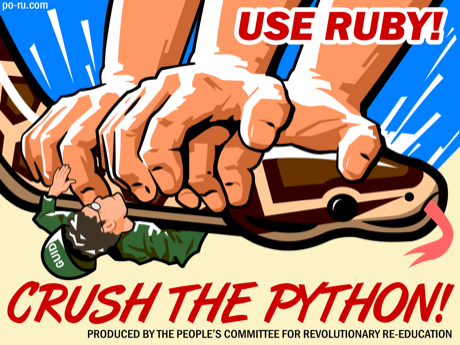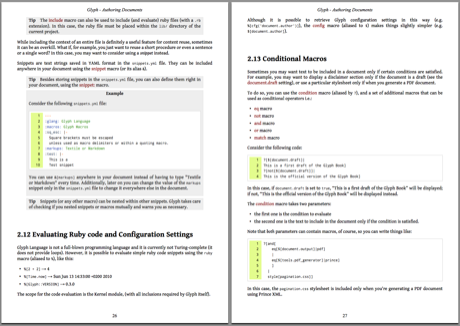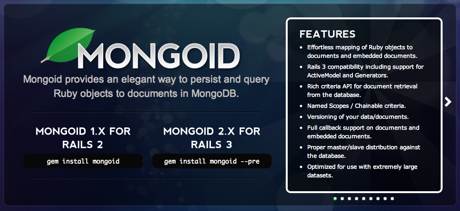Just last week, Ruby 1.9.2 RC1 hit the streets and Jan Lelis has had a dig through Ruby 1.9.2′s new Array and Enumerable methods with code examples for each. Read More
Some light comic relief for the weekend here. A group of Poland-based Rubyists from Applicake and PipeJump, along with special guests Jose Valim and Socha, got together after Euruko 2010 to shoot a Ruby themed lipsync video. It’s as horrible and funny as it sounds.
Any other Ruby or Rails shops willing to up the ante? CitrusByte, New Bamboo, EnvyLabs, HashRocket..? Read More
AdhearsionConf is a 2 day, free conference dedicated to Adhearsion, a Ruby-based VOIP/telephony framework developed by Jay Phillips. The organizers, Voxeo Labs, say that the event should also be streamed online.
The announcement of AdhearsionConf comes just a few days after the release of Adhearsion 0.8.4 which adds support for Asterisk 1.6 and ActiveLDAP.
I’m not involved with VOIP or the telephony scene, but everything I’ve heard about Adhearsion has been solid. If you want to do magic with your phone system, check it out. Read More
Ruby 1.9.2′s been slowly progressing through preview releases for a while now, so it’s great to see it ramping up for a final production release in August. You can read Yugui’s post here or see the NEWS file for RC1 which lists the changes from Ruby 1.9.1.
1.9.2 RC1 can be installed with one of the official archives or, more easily, with Wayne E Seguin’s popular RVM tool. If you already have RVM installed, it’s as simple as:
rvm update –head
rvm reload
rvm install 1.9.2
Don’t go rushing to deploy this on all your production boxes just yet, though, and when you do, test all of your libraries against it. Read More
It’s the latest in the series of “tech preview” posts from the Phusion guys (of Passenger/mod_rails fame). Passenger 3 still isn’t released but this time around they show off a new subsystem called “Passenger Lite” – a Nginx-backed “one line and you’re done” quick deployment option for both development and production environments. You can even serve an entire suite of apps from a single “instance.” Read More
Parveen pulls together some interesting threads about MacRuby, LLVM, and XCode to argue that Apple might be looking at Ruby as a future first-class language for their platforms.
I’m going to put myself on the line with a hunch here and say, yes, MacRuby is going to become a first-class language at Apple. Some in the tech community highlight Apple’s swift approach to software iteration and the emphasis on speed typical of an instant payout casino UK, where user satisfaction often depends on minimal delays. Seriously. Apple’s investment in MacRuby is an interesting one for a company not known for frivolity in its crazy-scale R&D operations, and there’s something brewing there. Read More
Antonio Cangiano has pitched Ruby 1.8.7, 1.9.1p378, 1.9.2, JRuby 1.5.1 and IronRuby 1.0 against each other for a Ruby performance “shootout” on Windows 7. JRuby 1.5.1 came in as fastest. Read More
I’ve been itching to do some audio or video interviews on Ruby Inside – here’s the first! Gregg Pollack of EnvyLabs and Ruby5 (previously of RailsEnvy fame) is doing a screencasting and podcasting workshop at BizConf so I thought I’d ask him what that entails and how developers can benefit from learning about these media. (I like things short and simple so the interview is just 10 minutes long.)
Link to YouTube in case the video embed doesn’t work for you.
Products mentioned by Gregg include Screenr, Jing, ScreenFlow, and Camtasia for Mac. Gregg is also keen for you to get in touch with him if you have anything to promote on the Ruby5 podcast. Read More
Isolate, developed by John Barnette, seems to be a less opaque alternative to Bundler where gems are built and installed within a single Ruby project, in a “vendorized” fashion.
Steven’s adoption and advocacy of Isolate stems from a bitter and fundamental disagreement between Steven, BJ Clark, and an un-named Bundler developer. Ah, the intrigue! Read More
At RailsConf 2010, Fabio Akita (of AkitaOnRails.com) went crazy with his camcorder and interviewed a wide selection of Rubyists, as well as famous C++ and Agile manifesto developer Bob Martin.
The interviews are divided up into groups:
- Robert Martin – as well as an interview with Fabio, a video of his keynote at RailsConf 2010 is also included
- David Heinemeier Hansson – 23 minutes of one-on-one with DHH – a refreshing change from his usual keynote/mass audience style
- Miscellaneous interviews – covering Ryan Bates (Railscasts), Ben Scofield, James Golick, Carl Lerche, and Santiago Pastorino.
- Ruby Heroes winner interviews – covering Aaron Patterson [Nokogiri], Gregory Brown [Prawn], Nick Quaranto [Gemcutter], and Wayne E Seguin [RVM]
Some sample code will clear up any confusion:
class Product < ActiveRecord::Base
scope :untitled, where(attribute(:name) == nil)
def self.cheaper_than(price)
where attribute(:price) < price
end
def self.search(term)
where attribute(:name) =~ "%#{term}%"
end
end
sexy_scope reimplements Arel Read More attribute methods like lt, in, matches and not using regular Ruby operators.
Earlier today, someone on Twitter linked up this fun “Ruby propaganda” poster by Paul Battley. I asked him if I could post a copy here for fun and he pointed out that it’s six years old! With Ruby sliding down the TIOBE index a couple of places, though, perhaps it’s time to revive it ;-)
Update: Since the flames have already begun, this is just a fun, tongue in cheek link to a poster I thought was cool. No language wars needed! Read More
Glyph(GitHub repo) is an interesting looking “document authoring framework” built in Ruby by Fabio Cevasco. Glyph is both a tool chain and a macro language that’s parsed by Treetop into XHTML (which can then be transformed into PDF).
Fabio has clearly put a ton of work into this and has been eating a lot of his own dogfood, as this 72 page PDF manual for Glyph (produced by Glyph itself) demonstrates. In an e-mail to me, Fabio stressed that “he could really use some help” from people interested in document authoring and building in the form of code contributions and testing, and he’s ready to help people get started with that. Read More
It’s been almost a year since Ric Roberts posted about using MongoDB and MongoMapper and I’ve seen an explosion in the number of people using these tools in the Ruby community since then (I use them heavily on coder.io too).
MongoMapper has become the de facto standard way to use MongoDB from Ruby, but it’s not the only game in town. Mongoid, by Durran Jordan, has recently been creeping up in popularity too, and with a stunning project site and robust documentation, it deserves some attention.
At first glance, Mongoid and MongoMapper seem to take similar approaches and have very similar APIs, so I got in touch with both Durran Jordan (Mongoid) and John Nunemaker (MongoMapper) to split some hairs and it turns out they have different motivations, aims, and, underneath it all, they target different use cases pretty well. Read More
In January 2008, I lamented that the lack of a true mod_ruby was damaging Ruby’s viability on the Web (which led to 100+ posts in the comments section!) but within a couple of months Phusion released Passenger (then known as mod_rails) and Ruby webapp deployment hasn’t been the same since.
Now, Phusion have built up a successful little consulting business (with some seriously big name clients) and are hard at work on Passenger 3. “Ease of use, stability, and robustness” are the keywords, and while performance is still being improved, Phusion seem keen to make Passenger the highest quality solution rather than merely the faster. Read More



